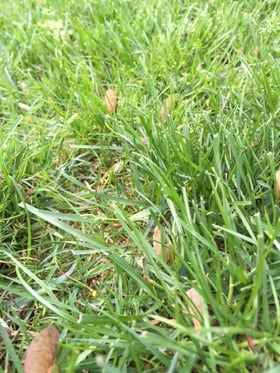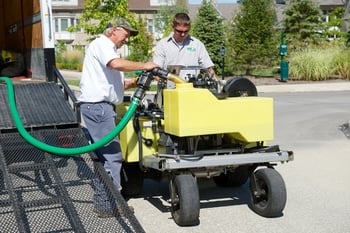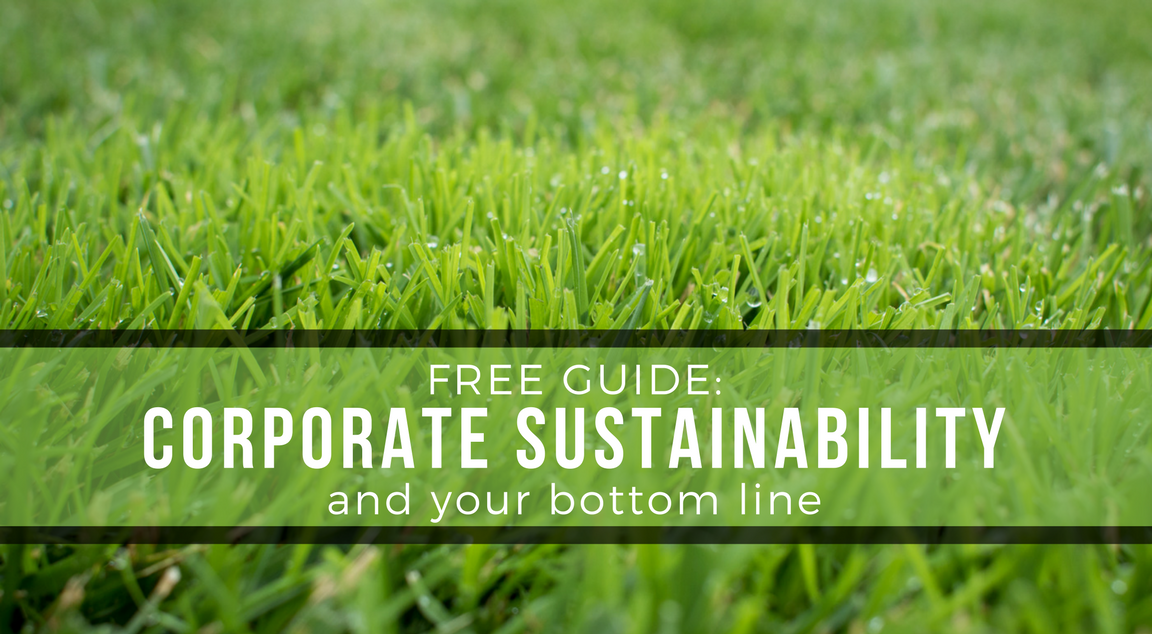 What exactly is organic fertilizer, and does a synthetic lawn care program really make grass greener? What about hybrid fertilizers—what do they contain, and is this a way to get the best of both worlds?
What exactly is organic fertilizer, and does a synthetic lawn care program really make grass greener? What about hybrid fertilizers—what do they contain, and is this a way to get the best of both worlds?
Fertilizer can be confusing, and our commercial clients who value sustainability often want to know, “What’s the real difference between these fertilizers?”
There is an abundance of information out there about the pros and cons of various fertilizers: synthetic vs. organic vs. hybrid. Unfortunately, a lot of what you read and hear can be grounded in bias marketing.
Commercial lawn care companies that promote synthetic programs talk about “quick green-up,” while organic-based landscape services promote a natural solution (you’ve heard you’ll have to put up with some weeds here and there). Hybrid fertilizer is just confusing. What is it exactly?
Let’s halt the fertilizer debate for a minute and run through the pros and cons of each type of fertilizer.
How Does Lawn Fertilizer Work?
Before we launch into details about synthetic, organic and hybrid fertilizers, it’s important to understand what fertilizer is actually made of and how it works. So here is a brief chemistry lesson. Stick with us here.
The active ingredients in fertilizer are nitrogen (N), phosphorus (P) and potassium (K). Nitrogen is responsible for making grass green, phosphorus is slower-acting and promotes root development, and potassium feeds the lawn over time and works to keep it strong during drought and other stressful conditions.
All fertilizers contain NPK, but the source of that NPK is what makes the difference between a synthetic and organic product. Synthetic fertilizers contain NPK that is derived from chemicals. Organic fertilizers get their NPK active ingredients from natural elements, including biosolids, manure and other protein byproducts.
The NPK is what makes fertilizer work, but it’s not as simple as putting the product on your grass. Fertilizer is activated when the soil beneath your grass “digests” the NPK ingredients, so the health of your soil is a critical factor in whether your lawn will take up fertilizer efficiently and effectively. If soil lacks microbiology (ability to break down nutrients in fertilizer), then the products you apply to your lawn—organic or synthetic fertilizer—will run off and potentially drain into your water supply.
Why Is Fertilizer Runoff Bad?
There are a couple of reasons why you want to avoid fertilizer runoff. For one, you are wasting product, which means you’re watching money literally wash down the drain. Secondly, fertilizer runoff contributes to harmful environmental scenarios. Nitrogen and phosphorus do the same work in lakes that they do on your yard: promote green, leafy plant growth.
When this happens in lakes, the fertilizer runoff can stoke the growth of toxic algae blooms that consume vital oxygen from water and cause existing wildlife (fish, beneficial organisms) to suffer. Eventually you end up with “dead zones” where wildlife cannot live because there is not enough oxygen or nutrients for them to survive.
The bottom line: We believe that fertilizer runoff is an important environmental issue that we must all consider when choosing commercial lawn care products like fertilizer.
Fertilizer 101: Synthetic Vs. Organic Vs. Hybrid Fertilizers
 Now that we covered what makes fertilizer work (NPK), why synthetic and organic fertilizers are different, and why soil quality is important, let’s move on to a pro-con analysis of different fertilizer types — synthetic, organic and hybrid — and answer the age-old question: "What is the best fertilizer for grass?"
Now that we covered what makes fertilizer work (NPK), why synthetic and organic fertilizers are different, and why soil quality is important, let’s move on to a pro-con analysis of different fertilizer types — synthetic, organic and hybrid — and answer the age-old question: "What is the best fertilizer for grass?"
Synthetic Fertilizers
Synthetic fertilizers are the standard product traditionally used in commercial lawn care programs to prevent weeds and disease, and to help grass grow green and healthy. Synthetic fertilizers have been used for years on lawns, and they generally involve up to six applications of products throughout the season that blanket the lawn with weed, disease and pest control. An emerald green lawn is the hallmark of synthetic fertilizers or at least what companies selling these products promote.
The downside of synthetic fertilizers is that they do not address soil health and instead focus on maintaining the lawn’s appearance. Also, synthetic products tend to be more water soluble, making runoff a greater concern. The benefit of synthetics for many commercial property owners is cost. Because the products are readily available on the mass market and the labor involved in applying them is minimal, landscape companies can offer synthetic fertilizers at competitive prices.
Organic Fertilizers
Organic fertilizers are comprised of ingredients found in nature, not produced in a lab. Quality organic fertilizers are made from bionutritional products, and they act like probiotics that improve soil’s ability to digest fertilizer and absorb nutrients. Not all organic fertilizers are created equally.
When seeking out an organic fertilizer, you want to choose a formula that is designed to enhance soil quality, which lays the groundwork for a healthy lawn. Organics that are simply spread on a lawn with poor soil quality will run off just like synthetic fertilizer. That nitrogen and phosphorus in runoff can threaten the water supply. Remember, healthy soil must take up the fertilizer in order to keep it in place and prevent harmful runoff.
The pros of organic fertilizers are that you’re putting a product that nature intended on your commercial property. The grass is safe for people and animals to walk on immediately after it is applied because there are no chemicals involved.
In a pure organic fertilizer program, no synthetic weed control is used, which can result in labor-intensive processes (hand-pulling weeds) that may drive up cost. The price of organic fertilizer tends to be higher than synthetics, but the product you’re getting is improving the overall health of your lawn. That means that over time, you will need less organic fertilizer to do the job, whereas with synthetics you’re continuing to “cure” the façade of the lawn and not addressing the root of weed and disease problems.
Hybrid Fertilizer
When it comes to choosing the right fertilizer for your grass, there's more to it than deciding between organic vs. synthetic fertilizer. For commercial property owners who want to bridge from a synthetic fertilizer to organic, a hybrid fertilizer program allows them to move the needle toward a sustainable program that’s cost-conscious and focused on the health of their landscape.
The reality is, some property owners steer away from organics because they think that means they will have to tolerate weeds in the lawn—and that is sometimes true. A hybrid approach uses organic fertilizers and addresses weeds by micro-spot treating problem areas. That way, chemical use on the property is tightly contained and minimal.
The benefit of a hybrid fertilizer approach is that you are building soil health which results in green, weed- and disease-free grass. By using organic fertilizers with probiotics that improve soil, you can use up to 75 percent less nitrogen and phosphorus (N and P). Less product, organic or synthetic, is always better.
A word of warning with hybrid fertilizer: companies can claim to use “organics” and “hybrid fertilizer” on your property, but find out how the fertilizer actually works. How much of it is applied to the lawn? How is the company addressing soil health? A true hybrid or organic program does not overlook these factors.
Choosing The Right Fertilizer: Think Long-Term About Your Lawn’s Health
 There are three types of fertilizer approaches you can take on your property, and two of those involve using organic products. At Schill, we provide a hybrid fertilization program that gives our commercial property owners the benefits of improving their lawn’s health and getting the green grass they want, while addressing weeds as they crop up so they do not proliferate into a problem that’s harder to control and requires more chemicals.
There are three types of fertilizer approaches you can take on your property, and two of those involve using organic products. At Schill, we provide a hybrid fertilization program that gives our commercial property owners the benefits of improving their lawn’s health and getting the green grass they want, while addressing weeds as they crop up so they do not proliferate into a problem that’s harder to control and requires more chemicals.
We take a less-is-more approach to using synthetics in the landscape, and we work with our commercial property owner clients to help them move from a total synthetic program to organics in an effective, cost-conscious way.
Schill can help you figure out which fertilizer is best for your commercial property's turf. Let’s talk more about fertilizer options including the Holganix organic fertilizer that is giving clients like you the results they want. Contact us any time at (440) 327-3030, or fill out this simple contact form, and we’ll get in touch with you.





